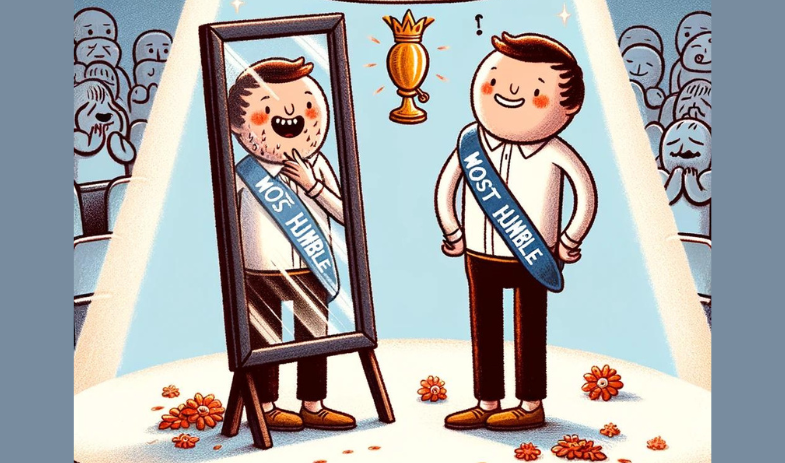Introduction:
Humility is a virtue that everyone seems to admire, but it’s a tricky one to grasp. In fact, I think the very act of claiming or preaching humility creates a bit of a paradox. Here’s a joke I came up with that sums it up pretty well, and it’s led me to some interesting thoughts about the nature of humility.
The Joke:
“My humility extends only as far as admitting it’s nonexistent.“
My Take on the Joke
The Surface-Level Humor:
Okay, I’ll admit it – this statement sounds a bit like a riddle. How can you say you’re humble enough to admit you’re not? That’s where the initial humor comes in – it’s a bit of a mind-bender.
The Paradox of Humility:
- Claiming Humility: The moment you say, “I’m humble,” haven’t you kind of defeated the purpose? True humility doesn’t need to announce itself.
- Admitting Non-Existence: The second part of the joke is where it gets interesting. By admitting that humility might not be something you can actually “have,” we’re embracing the paradox. It’s like saying, “I’m so humble, I realize I can’t even claim to be humble.“
- Self-Awareness and Irony: This joke isn’t just about poking fun at humility. It’s about recognizing the irony inherent in trying to be “the most humble person.” It’s a self-aware perspective that might actually bring us closer to true humility.
A Critique of Virtue Signaling (and Preaching):
This joke is a gentle critique of those who seem to flaunt their virtues – or preach them – for recognition. Humility, in its truest form, isn’t about getting praise or attention. By preaching humility, you are, in effect, claiming to be some sort of humility overlord.
Humility: A Metaphysical Concept
Humility isn’t a tangible thing you can measure. It exists in our actions and intentions, not in our declarations. It’s more about how we live our lives than what we say about ourselves.
To Encapsulate Humility’s Paradox:
- Claiming to be humble negates humility: If you have to say you’re humble, you’re probably not.
- Perceiving yourself as humble is contradictory: True humility doesn’t focus on the self.
- Preaching humility misunderstands its essence: Humility isn’t a sermon; it’s a way of being.
In essence, humility cannot be proclaimed or self-identified without losing its true nature. It’s found in the quiet actions and attitudes of those who live authentically, unconcerned with their perception.
In Conclusion
Claiming to be humble is a bit like trying to catch your own shadow – it’s always just out of reach. True humility exists in the quiet moments of genuine selflessness and understanding, not in the loud proclamations of those seeking recognition. So, the next time you hear someone grandstanding about their own humility, take it with a grain of salt. And if you find yourself cornered by a self-appointed humility guru, remember: the loudest preachers of virtue are often the ones who need it most. Perhaps a little self-reflection, rather than self-congratulation or unsolicited sermons, would bring them closer to the true meaning of this elusive virtue.
Because, newsflash: if you have to tell someone else they need to be more humble… well, you might want to check your own humility meter.
